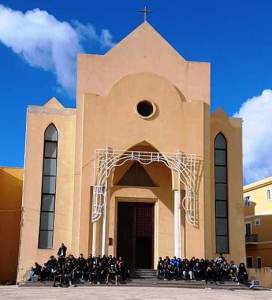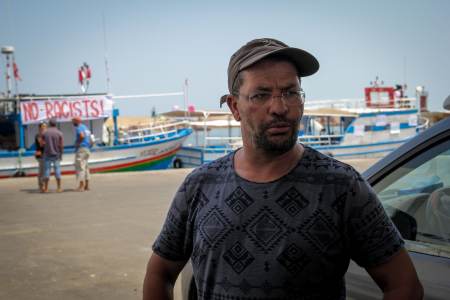History repeats itself: a day of remembrance in Lampedusa
Three days ago, the day of memory was celebrated and everywhere we could read words that for some politicians meant to express hope and renewal. But for us, they are empty of significance, given that in the moment of celebration the silent and subtle mass killing of the migrant people continues.
Commemoration, as someone says, should not be celebrated but should be lived every day. Maybe this is the only way that this story can be changed, our story, the story of our days. Unfortunately, history is written by the powerful on earth, who in this historical period are telling lies, sweet lies, to hide what could arouse consciousness. In compliance with media and journals, they make us forget what really happened, in order to reiterate, with different actors, with other victims, the same shame in the name of power and greed.
This demonstrates the continuing bloodsheds of men, women and children at sea, the mass graves in the desert and the violence in Libya. This explains the dirty work of Libyan and Turkish forces that have been armed and commissioned, the deafening silence concerning violence against Palestinians and Kurds or the complete absence of reports on the never-ending wars in Syria, Congo and other African countries. This explains the abandonment and the exploitation of thousands of men and women in our countrysides and on our streets, or the detention in non-places and the confinement of people behind physical and psychological, unsurmountable barbed wire and walls.
In these “days of remembrance” at Lampedusa none of the Tunisians present in the hotspots have been protesting. They have sewed their lips, because they have been held for too long inside this disgraceful centre/prison as denounced by the national guarantor for people deprived of liberty after a visit in the hotspot.
An open-air prison, where the police can wake you up in the middle of the night to put you on a bus and bring you directly back to the place you escaped, because violence and lack of freedom are ruling over you, especially when you are poor.
“One year after my last visit nothing has changed” denounced the national guarantor. The suicide of one Tunisian man that happened a couple of weeks earlier is attributed to this context. The responsibilities are multiple, starting with a distortion created by emergency management of the migratory phenomenon, continuing with an incapacity to listen and confront all subjects that work on the ground, even sensitised spokespersons from the local population.
The Tunisians in Lampedusa are locked up for weeks, months, in a centre where the squat toilets have no doors, mattresses are dirty – according to the national guarantor nobody would like to sleep on them – where there is no place in the canteen and people eat standing outside in the courtyard even when it’s raining. One escapes death at sea to finish locked up for indefinite time, deprived of all rights. In this kind of situations even the strongest person risks going crazy. The national guarantor denounces all of the above in the aftermath of his visit in Lampedusa. Fights are on the daily agenda, as well as continuing protests and unceasing attempts to escape.
Despite the multiple denunciations, not only from authorities, but particularly by this civil society who are unrecognised as a counterpart in decisional processes, the story is written incorrectly. A story that says that the Tunisians do not merit any protection, that they are violent and criminal, and that we must protect ourselves. That says that our security is in danger and not that of the people exposed to inhuman, humiliating and degrading treatment.
Facing the risk of mass deportations – that happen regularly on Mondays and Thursdays as foreseen by the bilateral agreements of the Italian and Tunisian government – people protest in a silent way, sewing their mouths and respecting the islanders who are accommodating them. A strike that has been going on for 6 days, supported by the priest and the whole forum of Lampedusa on the front line, providing psychological support to those men who are only asking for respect of their rights and who are claiming free movement and dignified living conditions.
Again – like history, the real one, teaches us – the hope that something changes is passed on by plenty of Lampedusian residents, who are available, welcoming and that advocate for humanity. Humanity is made from simple gestures: standing close, making available the bathroom of the parish, giving a blanket for relief from the cold, being present and listening. These Lampedusians show us that no matter the place of origin, everybody is worth listening to and should be treated humanely, regardless of their juridical status.
The Geneva Convention seems to be a waste paper, transformed into a proclamation of rights for privileged migrants, some category into which Tunisian citizens do not seem to fit. And therefor they protest, and they sew their mouths. Their wish to join a relative here in Italy or in Europe is bigger than the fear of dying at sea.
The last death was discovered just some days ago: the dead body of a man was found on the beach of Torresalsa in the province of Agrigento. He arrived with one of the boats which are “not intercepted” by the Frontex wall. Some of the Tunisians had survived the crossing of the Mediterranean and managed to arrive, almost lifeless, by foot in the province of Ragusa: A woman in very bad health conditions and an injured man presented themselves at the police head quarter for humanitarian protection but directly received a removal order. The woman was immediately transferred to the CPR Ponte Galeria in Rome, while the man, thanks to a solidarity network, was able to express his wish to ask for asylum and challenge the expulsion.
These uncountable nights of protest with sewed lips and hunger strikes serve to make people understand that things have to change, that this story cannot repeat itself. So many organisations and individuals have already understood, that’s why they stay close to support those who arrive on Sicilian shores.
Remembrance will be celebrated every day, to live and act in respect of the thousand lives that today, like in the past, parish due to the total indifference of the so-called “civil society”.
Alberto Biondo
Borderline Sicilia
Translation: Helena Hattmannsdorfer





